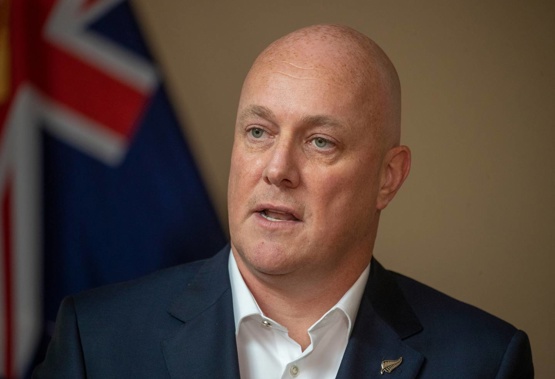
National Party leader Christopher Luxon is calling on parents of young offenders to take responsibility for their actions.
Speaking to AM this morning, Luxon said he was concerned that truancy rates were up around 55 per cent, with 100,000 students deemed to be chronically truant.
He said this was a major driver of the ram raids being committed by youth and encouraged parents to think about what was going on in their families.
"If you don't know where your 12-year-old is between midnight and 5am in the morning, if you're not laying down boundaries for your kids, if you're not actually waking up in the morning and getting your kids to school... isn't that the primary responsibility for us as parents to set our kids up so that they have opportunities we didn't have and that they can go forward and get ahead in life?"
He also called on Chris Hipkins to "have a talk with himself" to get children back into school.
"We've got a minister fortunately who is also the Minister of Police and the Minister of Education and I keep saying he should actually have a talk with himself to work out how he actually fixes truancy," he said.
This comes as the Government is lauding its new $53 million package, called Better Pathways, to tackle the current youth crime spike that is prompting calls for harsher consequences for persistent offenders.
The approach, created by the South Auckland Social Wellbeing Board, brought together members of police, Oranga Tamariki, Counties Manukau Health, education, Kāinga Ora, the Ministry of Social Development, local non-government agencies and Te Iwi o Ngāti Kahu to review cases of youth offenders caught in the preceding 24 hours.
Designed as a timely response to vehicle-related offending among young people, the group focused on children under 14 who were apprehended for serious offences such as fleeing police or ram-raiding.
In the past four months, the approach had led to only 13 of 52 children reoffending and just four new reports of concern from Oranga Tamariki.
Six had been supported back into education. Only 19 were in education to start with.
Of the 52, 50 had been exposed to family harm - some experiencing as many as 30 incidents.
Board programme director Ann Wilkie, also an Inspector with Counties Manukau Police, is optimistic further funding for the approach would lead to positive results.
"This additional money is going to be an important aspect of supporting the community to be actually part of the work that needs to be done," she told the Herald.
"In the short term, it's certainly an approach that we were able to prove without additional funding and now the additional funding will make it more sustainable."
A key priority of Kotahi te Whakaaro was to widen their view from solely focusing on the offender and examining what support was required by the whānau unit.
"If we can stop the siblings from going down the same path and we can stop these [offenders] and give them a second chance and they don't enter the youth justice system, then we know we're on a winning formula," Wilkie said.
Crucial for success was effective collaboration and flexibility, something government agencies sometimes struggled with, Wilkie noted.
"If you can't get government agencies working nicely together with the community and iwi, then you're actually wasting your time."
Amid a more than 500 per cent increase in ram raids over recent years and 357 having taken place this year alone, the National Party has repeatedly called for tougher penalties for repeat offenders.
Luxon, however, did not support Act Party leader David Seymour's suggestion to give all serious youth offenders ankle bracelets to curb their behaviour.
"Ankle bracelets are non-intrusive and allow the police to know where they are at all times," Seymour said.
"It is an easy way to enforce curfew, to make sure kids are at school and to separate young offenders."
Take your Radio, Podcasts and Music with you









